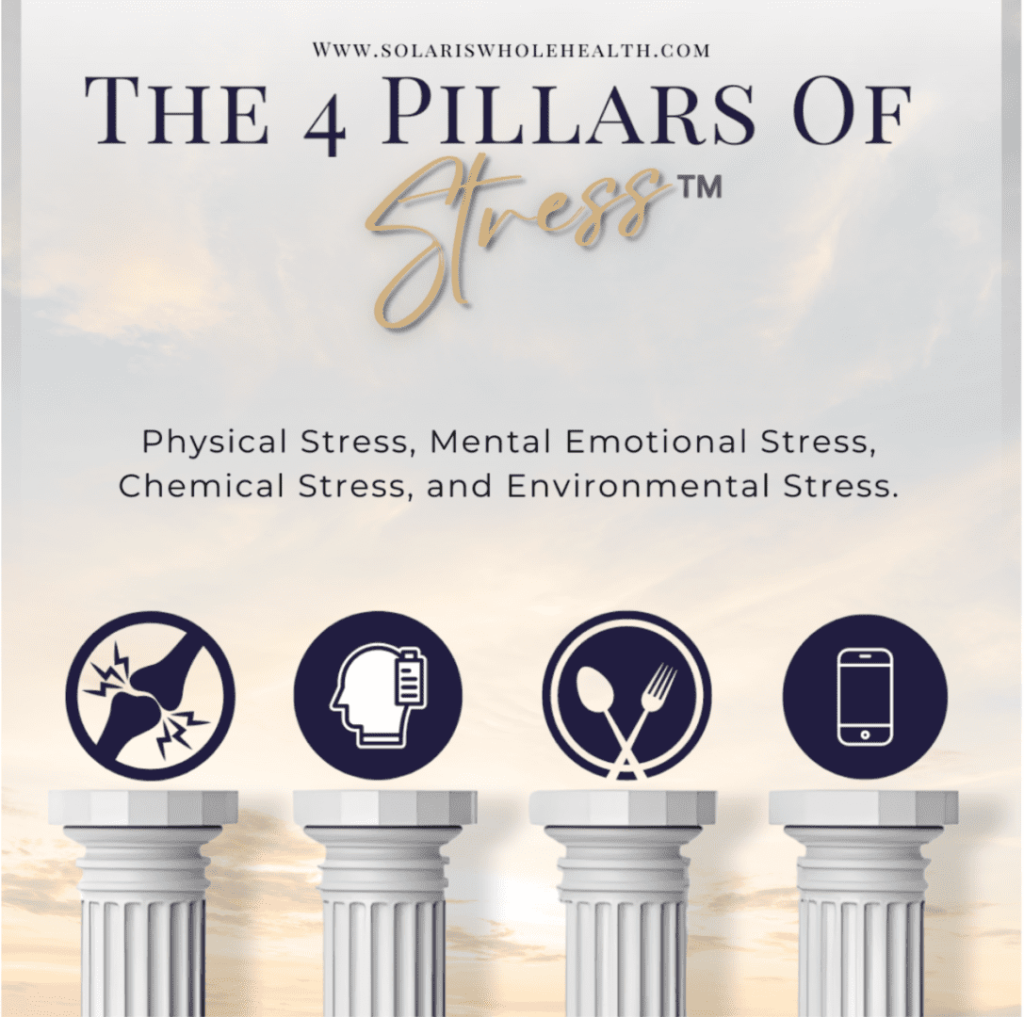Rethinking Multivitamins: Are You – Wasting Your Money?

Walk into any pharmacy or grocery store, and you’ll find shelves lined with multivitamins promising everything from improved immunity to better energy levels. For decades, we’ve been told that taking a daily multivitamin is essential for good health. But what if most of these products are doing little to nothing for your well-being? Dr. Mark Hyman, a leading expert in functional medicine, has raised an important discussion in his podcast “The Doctor’s Farmacy,” about why most multivitamins are a waste of money. The reality is that while supplementation is crucial, not all supplements are created equal—and taking a one-size-fits-all approach to nutrition may be doing you more harm than good. At Solaris Whole Health, we focus on personalized supplementation, ensuring that your body gets exactly what it needs—not just a generic mix of vitamins and minerals. Let’s explore why most multivitamins fall short and what you can do instead to truly support your health. The Problem with Most Multivitamins 1. Low-Quality Ingredients & Poor Absorption Many mass-produced multivitamins contain cheap, synthetic ingredients that your body struggles to absorb. For example: Vitamin B12 is often in the form of cyanocobalamin, which must be converted into its active form (methylcobalamin) before your body can use it. Magnesium is commonly found in magnesium oxide, a form with low bioavailability that doesn’t effectively support cellular function. If your body can’t properly absorb the nutrients in your multivitamin, they end up being excreted— meaning you’re literally flushing your money down the drain. 2. Generic Formulations Don’t Address Individual Needs Every person has unique nutritional requirements based on genetics, lifestyle, diet, and existing health conditions. A one-size-fits-all multivitamin won’t address specific deficiencies or imbalances. For example, some people may need higher levels of vitamin D due to low sun exposure, while others might require extra B vitamins to support energy metabolism. Without proper testing, you could be taking the wrong combination of nutrients—or missing the ones you truly need. 3. Lack of Synergy Between Nutrients Nutrients work together in the body, and balance is key. Many multivitamins don’t consider how vitamins and minerals interact. For instance: Calcium and magnesium should be taken in proper ratios to avoid muscle cramps and imbalances. Iron competes with zinc for absorption, which can lead to deficiencies when not properly balanced. Poorly formulated multivitamins can create imbalances that may lead to long-term health issues instead of benefits. 4. Hidden Fillers and Additives Many multivitamins contain unnecessary fillers, artificial colors, and preservatives that can be harmful over time. Ingredients like titanium dioxide (used for coloring) and hydrogenated oils have no place in a product meant to support health. Why Personalized Supplementation Is the Answer Instead of relying on generic multivitamins, a personalized approach to supplementation ensures you get the nutrients your body actually needs. At Solaris Whole Health, we take a functional medicine approach to wellness, which means we: Assess your individual nutrient levels through advanced testing. Create customized supplement plans tailored to your body’s needs. Use only high-quality, bioavailable nutrients for optimal absorption. Introducing Solaris Premium Supplements Our line of Solaris Premium Supplements is designed with purity, potency, and effectiveness in mind. Unlike conventional multivitamins, these products: Contain high-quality, bioavailable ingredients that your body can absorb and use effectively. Are free from unnecessary fillers, artificial colors, and harmful additives. Are backed by science and formulated to support optimal health at the cellular level. Some of our top personalized supplement solutions include: Solaris Daily Essentials – A foundational blend of vitamins and minerals designed for maximum absorption. Solaris Immune Support – A targeted formula to strengthen your immune system with high-potency vitamin C, zinc, and adaptogenic herbs. Solaris Gut Health – A combination of probiotics, digestive enzymes, and gut-supporting nutrients to optimize digestion and nutrient absorption. You can explore the full range of Solaris Premium Supplements at solarispremium.com. How to Find Out What Your Body Needs If you’re ready to stop guessing and start giving your body exactly what it needs, consider working with a functional wellness expert who can guide you through the process. At Solaris Whole Health, we offer: Comprehensive Nutrient Testing – Identify deficiencies and imbalances. Personalized Supplement Plans – Get recommendations tailored to your health goals. One-on-One Coaching – Learn how to optimize your nutrition and lifestyle for long-term wellness. Invest in Your Health the Right Way The truth is, taking the wrong multivitamin—or one with low-quality ingredients—won’t do much for your health. Instead of wasting money on generic supplements, take a targeted approach that supports your unique body’s needs. If you’re ready to take control of your health and get supplements that actually work, visit Solaris Whole Health to schedule a consultation. Together, we’ll create a supplement plan designed specifically for you. Because when it comes to your health, personalization makes all the difference.
Understanding Auto-Brewery Syndrome: When Your Body Becomes a Brewery

Imagine this: you’ve been feeling foggy, unsteady, or downright “off,” but you haven’t had a single sip of alcohol. Yet somehow, your body feels like it’s processing a drink (or three). If this sounds familiar, you may be dealing with a rare condition called Auto-Brewery Syndrome (ABS). What Is Auto-Brewery Syndrome? Auto-Brewery Syndrome is exactly what it sounds like—your gut essentially turns into a brewery, fermenting carbohydrates into alcohol (ethanol) inside your digestive system. The result? Your blood alcohol levels can rise, leading to symptoms like: -Brain fog -Dizziness or lack of coordination -Fatigue -Mood swings -Digestive discomfort -Unexplained weight changes ABS often goes undiagnosed because it’s so rare, and many conventional doctors aren’t familiar with it. Worse, you might feel dismissed or even judged for your symptoms. But here’s the thing: your symptoms are real, and they deserve attention. Why You Need to Be Proactive Living with untreated ABS can take a toll on your health and quality of life. Regular “alcohol episodes” can disrupt your daily routine, strain your relationships, and even lead to dangerous situations if blood alcohol levels spike unexpectedly. Left unchecked, ABS can also harm your gut health and immune function. Can Stress Cause Flare-Ups? Absolutely. Stress doesn’t just affect your mood—it can disrupt your gut microbiome, the delicate balance of bacteria in your digestive system. In people with ABS, stress might exacerbate symptoms by promoting the overgrowth of yeast, like Saccharomyces cerevisiae or Candida. This overgrowth fuels the fermentation process, leading to more frequent or severe episodes. Why Functional Medicine Is Key to Putting ABS in Remission Treating Auto-Brewery Syndrome isn’t as simple as taking a pill. It requires a holistic approach, and that’s where functional medicine excels. Unlike conventional medicine, which often treats symptoms in isolation, functional medicine dives deep to uncover the root cause of your condition. At Solaris Whole Health, I take a comprehensive approach to wellness. With advanced testing, I can pinpoint imbalances in your gut microbiome, uncover triggers like diet or stress, and design a personalized plan to help you regain control of your health. Here’s how I can help: Extensive Testing: At Solaris Whole Health, we help you work smarter not harder. Our Elite Testing + Analysis gives us the information we need to develop your unique, multi-dimensional road-map to achieve your optimum health potential. From stool analysis to microbiome mapping, I do tests most conventional doctors don’t even consider. Personalized Supplement Plans: Based on your unique needs, I recommend Solaris Premium Supplements that target imbalances and promote healing. Diet & Lifestyle Changes: Together, we’ll craft a plan to support gut health, manage stress, and reduce symptom flare-ups. Collaborative Care: We believe that we are one part of your whole health team, and have a strong desire to work with your practitioners. As a result, we will send a letter to any doctor or practitioner you choose, to encourage healthy communication for success. I work with any of your current doctors to ensure your care is seamless. That’s why we’re called Solaris Whole Health. And Much, MUCH More! Let’s Start Your Journey to Wellness I’ve seen firsthand how transformative it can be to address the root cause of chronic health issues, and Auto-Brewery Syndrome is no exception. Imagine waking up with clarity, energy, and control over your health again—it’s possible, and I’m here to help you get there. Click HERE to set up your FREE 15-minute introductory consultation directly with me, Stephanie Solaris. Let’s work together to transform your health and elevate your life experience. Ending on a High Note Your symptoms are valid, and you deserve a partner in your health journey who listens, understands, and creates a plan just for you. At Solaris Whole Health, we don’t settle for “okay”—we aim for thriving. Why wait another day? Take the first step toward feeling your best and living the life you desire.
The Root Cause Revolution: A New Approach to Everyday Health

I’m Stephanie Solaris, owner of Solaris Whole Health and creator of the BRAND NEW Root Cause Revolution. As a seasoned functional wellness professional with 15 years of transformative guidance, I’ve empowered over 5,000 clients worldwide, including 90 pro and semi-athletes. ? My expertise spans menopause, stress, fatigue, weight management, hormone balance, sleep harmony, gut health, allergies, and even libido. 25 years ago, I embarked on a personal transformation that forever changed my life. I lost 100 pounds and, even through menopause, I’ve maintained that weight loss and continue to feel fantastic. The best part? I wasn’t just following conventional methods—I was my very first client! I grew weary of the yo-yo dieting, constant hunger, and persistent health symptoms that never seemed to improve. This frustration inspired me to create The Root Cause Revolution, a movement designed to address the underlying causes of health issues rather than merely masking symptoms. Unlike traditional healthcare, which often focuses on quick fixes, the Root Cause Revolution delves deep to find and address the root of the problem. Through advanced testing, personalized nutrition, supplements, lifestyle changes, and mindset shifts, we tackle the core issues to achieve lasting, sustainable health. The Power of Functional Wellness Many people don’t realize that the symptoms they experience—such as chronic fatigue, digestive issues, brain fog, or weight gain—often stem from deeper imbalances in their lifestyle and health. Functional wellness addresses these imbalances by considering the whole person and identifying the root cause of their issues. Unlike traditional methods that often only treat symptoms with medication, functional wellness seeks to find and fix the underlying problem. Have you ever experienced cravings that you just couldn’t shake? I certainly have! Giving in to those cravings didn’t help my health or waistline, so I developed the concept of Better Bad Choices. What Are Better Bad Choices? Instead of battling your cravings, honor them by making smarter choices. This approach, which I call “crowding out,” involves substituting healthier alternatives for your cravings. If you’re craving something sweet, opt for a nutrient-rich treat that satisfies your craving without derailing your progress. Swap out a greasy burger for a juicy turkey burger, or choose air-popped popcorn over buttery movie theater popcorn. By making these “Better Bad Choices,” you can enjoy your favorite flavors while still staying on track with your health goals. The 30-Day Cravings Challenge I’m thrilled to introduce the FREE 30-Day Cravings Challenge as part of the Root Cause Revolution! During this challenge, we’ll confront cravings, reset your diet, and learn to make Better Bad Choices—tasty, healthier swaps that keep you on track without sacrificing satisfaction. We’ll embark on this journey together, and by the end of the challenge, you’ll feel great, lose weight, and address symptoms like bloating, fatigue, and brain fog. Our approach also incorporates the 4 Pillars of Health: nutrition, exercise, stress management, and sleep. By focusing on these key areas, we ensure a comprehensive approach to wellness that supports long-term success and vitality. By making small, manageable changes—one choice at a time, one bite at a time—you can progress toward your wellness goals without feeling deprived. Through the Root Cause Revolution, we’ll achieve your health goals with a balanced, holistic approach that’s tailored to your needs. Join me on Facebook, Instagram, and now TikTok, where each week I’ll be posting great videos that I know you’ll be able to relate to! Let’s kick those symptoms to the curb—let’s eat better, live better, and feel better so you can live the life you desire. Click here to learn more about Solaris Whole Health and to schedule your FREE consultation directly with me, Stephanie Solaris.
How to Manage Weight Gain After Your 30s: Simple Tips for a Healthier You

As soon as you hit your 30s, your body starts to undergo some pretty noticeable changes. You may have already experienced it—clothes fitting a little tighter, energy levels dipping, and even weight gain that sneaks up out of nowhere. This isn’t just in your head. It’s happening because your body composition is shifting: lean muscle mass decreases while fat tends to increase. Add in a busy, stressful lifestyle that leaves less time for physical activity, and it’s no wonder the pounds start to creep on. Why Lean Muscle Mass is Key One of the biggest culprits for weight gain as you age is the loss of muscle mass. After age 30, lean muscle mass naturally declines by about 3 to 8 percent per decade—a process known as sarcopenia. Muscle plays a major role in your metabolism, burning more calories than fat does. So, as muscle mass decreases, your body needs fewer calories to function, making it easier to gain weight even if your diet stays the same. This decrease in muscle can negatively affect your metabolism, strength, and even your balance. It’s not just about looking good; it’s about staying strong and functional as you age. Hormone Imbalances As you enter your 30s and beyond, hormonal imbalances can play a significant role in making weight loss more challenging. Hormones like estrogen, testosterone, and insulin regulate key processes like metabolism, fat storage, and appetite. When these hormones become imbalanced due to age, stress, or lifestyle factors, it can lead to increased fat accumulation, especially around the abdomen, and make it harder to shed those extra pounds. For instance, lower levels of estrogen in women can lead to a slower metabolism and increased cravings, while declining testosterone in men can reduce muscle mass, which is essential for burning calories effectively. Beyond just slowing down your metabolism, hormonal imbalances can also lead to symptoms like fatigue, mood swings, and poor sleep—all of which can further sabotage your weight loss efforts. When your body is constantly battling these issues, it becomes harder to maintain the energy and focus needed for regular exercise and healthy eating habits. That’s why understanding and addressing hormone balance is key to successfully losing weight and maintaining a healthy body as you age. What You Can Do It’s not all doom and gloom, though. There are several practical steps you can take to help slow down weight gain and improve your overall health as you age. Here’s 5 Simple steps you can start taking today: Eat More Whole Foods: Opt for whole grains, fruits, vegetables like broccoli and citrus fruits, and even spicy foods like hot peppers. These are nutrient-dense and help keep you full while boosting your metabolism. Drink Green Tea: This natural antioxidant can help enhance fat burning and boost your metabolism. Cook More at Home: Preparing meals at home allows you to control portion sizes and ingredients, reducing the intake of highly processed foods. Stay Hydrated: Drinking plenty of water helps you stay energized and prevents overeating due to dehydration. Practice Mindful Eating: Pay attention to what you’re eating. Avoid distractions like TV or phones, and focus on your food to prevent overeating and poor choices. Portion Control is Crucial As your metabolism slows, managing your portion sizes becomes more important. Downsizing your portions while focusing on nutrient-rich foods can help manage weight without feeling deprived. How Solaris Whole Health Can Help You Reclaim Your Health Struggling with weight gain in your 30s and beyond often comes down to hormone imbalances and lifestyle shifts. That’s where I come in! At Solaris Whole Health, I use a functional wellness approach to get to the root of your weight gain, testing for hormonal imbalances and other underlying issues that traditional doctors might overlook. I also incorporate my 4 Pillars of Stress and my 4 Pillars of Health Formula to help you regain your vitality and energy, and finally shed those stubborn pounds. Ready to reclaim your vitality, energy and finally lose those unwanted pounds- and keep them off? Then click here to schedule your FREE call with me today! Let’s get you back on track to optimal health and happiness so you can live the life you desire. While you’re here check out the Best Foods & Drinks To End Your Day With.
The Hidden Toll: How Career & Finance Stress Impacts Your Health

In our fast-paced world, stress related to career and finances often goes unnoticed until it manifests in more serious health issues. This type of stress isn’t just about meeting deadlines or paying bills; it’s a significant factor affecting our overall well-being. Let’s dive into how financial and career stress can lead to chronic illnesses, disrupt sleep, encourage unhealthy coping mechanisms, and what you can do to manage these challenges. Chronic Illnesses: The Long-Term Effects of Financial Stress Ongoing financial stress doesn’t just weigh on your mind; it has tangible, long-term effects on your body. The constant worry about money can lead to a cascade of physical symptoms and chronic illnesses. Increased stress levels can cause high cholesterol, high blood pressure, and muscle tension. These symptoms are not just uncomfortable; they can escalate to more severe health issues. For instance, chronic stress is a known risk factor for heart disease and can even increase the likelihood of a heart attack. The body responds to stress by releasing hormones like cortisol and adrenaline, which, when persistently elevated, can damage the cardiovascular system over time. The Critical Role of Sleep Sleep is often the first casualty when financial worries become overwhelming. Yet, it’s one of the most crucial aspects of maintaining both physical and mental health. Adequate sleep supports the immune system, aids in recovery from illness or injury, and helps protect against various diseases. The “all-consuming” nature of financial stress can lead to disrupted sleep, poor sleep quality, or even insomnia. It’s a vicious cycle: lack of sleep increases stress levels, and heightened stress makes it even harder to sleep. Researchers have equated the importance of sleep to other basic necessities like food, water, air, and shelter. Without it, your body and mind struggle to function at their best. Unhealthy Coping Mechanisms When the pressure of financial stress becomes too much, some people may turn to unhealthy coping mechanisms. These can include heavy drinking, unhealthy eating habits, drug use, or even gambling. While these actions might offer temporary relief, they often exacerbate the problem. For example, poor eating habits can lead to weight gain and related health issues like diabetes or heart disease. Similarly, heavy drinking due to stress can lead to addiction and further financial strain, creating a dangerous cycle that’s hard to break. The Interconnected Pillars of Health At Solaris Whole Health, we understand that career and financial stress don’t exist in a vacuum. They are part of a broader picture that includes physical health, mental health, and relationships. If this fourth Pillar of Health—Career & Finance—falters, it can destabilize the entire system, much like a wobbly leg can tip over a table. The four pillars of stress we focus on—Physical, Mental/Emotional, Chemical, and Environmental—are all interlinked. These 4 pillars of stress are a result of imbalances within the 4 Pillars of Health. When one pillar is compromised, it affects the stability and balance of the others. How Solaris Whole Health Can Help Our approach at Solaris Whole Health is functional wellness. We don’t just address the symptoms; we look at the root causes. Whether you’re dealing with the physical manifestations of stress, struggling with sleep, or finding yourself in a cycle of unhealthy habits, Stephanie Solaris is there to help. Our 12-month Transformation Program is designed to guide you through each of these challenges, providing tools and strategies to manage stress, improve sleep, and develop healthier coping mechanisms. By focusing on all four pillars of health, we help you build a strong, stable foundation for long-term well-being. If you find yourself struggling with career and financial stress, remember you’re not alone. Take our FREE Stress Less Sleep More Quiz to find out what your stress and sleep habits say about you, discover your “Stress & Sleep Doppelgänger,” and get personalized tips to improve your well-being. For a more in-depth look at how your relationships and financial stress may be affecting your health, schedule your FREE 30-minute consultation directly with me, Stephanie Solaris, today. Let’s work together to create a balanced, healthier you!
The Vital Role of Sleep On Your Body

In our fast-paced world, the importance of a good night’s sleep often takes a backseat to the demands of daily life. We all know what to do, it’s doing it everyday or night that is the challenge. At Solaris Whole Health, we understand that sleep isn’t just a luxury; it’s a fundamental component of overall well-being. Let’s delve into the intricacies of what transpires when you consistently miss out on those crucial hours of rest, explore the scientific and medical aspects of how insufficient sleep can affect your body and mind and finally how to start fixing the root cause of the problem. The Body’s Energy Units: Unveiling the Importance of Sleep Think of your body like a finely tuned machine, and sleep as its essential refueling time – where it replenishes its energy reserves, aka our “energy units.” Every day, our bodies work hard, and sleep is when we get the chance to recharge. This restoration process is vital for keeping both our bodies and minds in top shape. Let’s dive into why that’s so important. “Sleep on it†Ever heard of the saying “just sleep on it†and then you wake up with a new or clearer understanding of a problem? That’s because when you sleep, your mind processes information, consolidates memories, and problem-solves without conscious effort. Without adequate sleep, your body and mind not only struggle to function optimally but also fail to efficiently process and retain information, hindering problem-solving abilities and overall cognitive function, creating a brain fog of sorts. The 4 Stages of Sleep When we sleep, our bodies go through different stages, each doing its part to re-energize and restore us. First comes non-rapid eye movement (NREM) sleep, starting with light sleep and moving into deeper sleep. During this time, our bodies repair tissues, build muscles and bones, and boost our immune system. As we delve deeper into NREM sleep, our brain activity slows down, allowing for vital processes like hormone regulation and cellular repair to kick in. Then comes rapid eye movement (REM) sleep, where our brains become more active. This stage is crucial for cognitive function, memory consolidation, and managing our emotions. It is when our mind sorts and cleans out the day and helps us solve complex problems and situations. This critical stage primes our brain for optimal functioning, setting the stage for effective decision-making and emotional regulation. REM sleep is also what helps us wake up feeling mentally sharp and refreshed. Without enough REM sleep, we might find ourselves struggling with thinking clearly and feeling emotionally off-balance. In essence, each stage of sleep plays a unique role in recharging our bodies. From healing tissues and boosting our immune system during NREM sleep, to sharpening our minds and managing our emotions during REM sleep, it’s clear that getting enough quality sleep is essential for our overall health and well-being. Hormones From a scientific standpoint, our bodies operate on a delicate balance of various processes that demand energy. Sleep is not merely a passive state; it’s a period of heightened anabolic activity, crucial for our overall well-being. During sleep, the body undergoes a series of complex processes essential for energy restoration and maintenance. As we mentioned, sleep is when the body prioritizes repair and regeneration. It’s during this time that tissues are repaired, muscles are built, and bones undergo remodeling. Moreover, the immune system gets a boost, with immune cells actively targeting and destroying pathogens, helping us stay healthy and fight off infections. Additionally, sleep plays a vital role in hormonal regulation. Growth hormone, for example, is primarily released during deep sleep, contributing to muscle growth, tissue repair, and overall physical development. Lack of sleep disrupts the secretion of hormones like cortisol, which can lead to increased stress levels, impaired glucose metabolism, and weight gain. Furthermore, sleep deprivation can affect the balance of estrogen, progesterone, and testosterone, influencing reproductive health and sexual function. Insulin, crucial for glucose metabolism, is also impacted by sleep, with insufficient sleep contributing to insulin resistance and higher blood sugar levels. Moreover, leptin and ghrelin, known as our stop and go signals for eating, are influenced by sleep, with disrupted sleep patterns leading to dysregulation of appetite control and potentially contributing to weight gain. This complex interplay highlights the importance of quality sleep for maintaining overall hormonal balance and metabolic health. So as you can see, failure to get sufficient sleep disrupts these processes, leading to imbalances that can have profound effects on our health. Not to mention, chronic sleep deprivation is associated with an increased risk of various health conditions, including obesity, diabetes, cardiovascular disease, and mental health disorders. The Ripple Effect on Mind and Body Like we just mentioned, lack of sleep doesn’t merely leave you feeling groggy; it can unleash a cascade of detrimental effects on both your mind and body. From irritability and mood swings to cognitive impairment and memory lapses, the consequences of sleep deprivation extend far beyond simple fatigue. When you’re consistently sleep deprived, your work habits suffer as your productivity and focus decline. Tasks that once seemed manageable become daunting, leading to increased stress and frustration. Moreover, relationships can strain as your patience wears thin and your ability to communicate effectively diminishes. This can create tension with loved ones and colleagues alike. Furthermore, sleep is essential for cognitive function and emotional regulation. During REM sleep, the brain consolidates memories, processes emotions, and enhances learning. Neuronal connections formed during the day are strengthened, contributing to better cognitive performance and emotional resilience. Ultimately, the overall quality of life deteriorates, as you find yourself struggling to keep up with daily responsibilities and enjoying activities that once brought you joy. That’s why sleep is so important! Just look at everything we have discussed and how sleep (or lack thereof) can affect your mind, health and body! That’s why it’s crucial to recognize the profound impact that insufficient
The 4 Pillars of Stress™

In the labyrinthine corridors of our well-being, The 4 Pillars of Stress™—aptly dubbed the 4 P’s—emerge as the compass guiding us through the intricate interplay of physical, mental/emotional, chemical, and environmental factors. At Solaris Whole Health, this paradigm shift transforms into more than a concept; it becomes a transformative philosophy, laying the foundation for personalized, science-based functional wellness. Throughout this comprehensive blog, we’ll unravel how our bodies function as a symphony of complex systems, meticulously dissecting each pillar. Get ready to explore real-world examples, delve into scientific intricacies, and discover how Solaris Whole Health not only coined the 4 Pillars of Stressâ„¢ but also employs them as a cornerstone. These pillars serve as a foundational guide for constructing scientific, personalized nutrition and lifestyle programs for individuals seeking guidance from Stephanie Solaris. From understanding sleep patterns to navigating the delicate molecular dance of chemical influences, our approach transcends conventional wellness paradigms. While people often perceive stress solely as mental and emotional, we recognize various categories of stress affecting the body in diverse ways, contributing to one’s present state. This holistic perspective lays the foundation for each individual’s epigenetic journey, where genetics represent our inherent traits, and epigenetics encompass how our bodies and minds respond to exposures and learned reactions. So, without further ado, let’s delve deep into the interconnected realms of ‘The 4 Pillars Of Stress™’. 1. The Physical Pillar The physical pillar, a cornerstone in our stress paradigm, intricately shapes our well-being. Sleep patterns, exercise levels, and genetic predispositions play pivotal roles in stress manifestation within this pillar. Disruptions in sleep or imbalances in exercise may amplify stress responses, while genetic predispositions can influence how our bodies cope with and respond to stressors. Understanding and addressing these physical aspects are crucial steps toward mitigating stress and fostering a harmonious physiological foundation. Now, let’s delve into examples of physical stressors for a more in-depth exploration. Examples Of Physical Stressors: –Sleep Patterns: Irregularities may lead to an array of health issues. –Exercise Levels: Striking a balance between over and under-exercise is pivotal. –Digestive Issues: From elimination challenges to heartburn, the digestive system plays a critical role. -Immune stress: When people get sick it’s a physical stress on the body. -Autoimmune Diseases: Delicate immune responses may be triggered. -Joint Stress: Muscle and joint-related pain resulting from stress. Functional Wellness Approach: Functional wellness at Solaris Whole Health dissects these nuances. Comprehensive testing deciphers imbalances, allowing for personalized lifestyle and nutrition plans tailored to rectify the root causes, promoting optimal physiological harmony. 2. The Mental/Emotional Pillar The mental/emotional pillar delves into the cognitive intricacies that shape our daily existence. From the meticulous realms of overthinking, to career and financial stresses, to the nuanced dynamics of family life— like those moments of anxiousness that impairs you from being your best self at home or work. All these factors intricately mold our mental landscape. Now, let’s delve into examples of mental and emotional stressors to further explore and understand their impact on our well-being. Examples: -Overthinking: Persistent thoughts. -Relationship stress: This can come from family, friends, co-workers and contract workers. -Career Stress: The psychological toll of professional challenges. -Financial and Family Stress: The intricate interplay of external pressures. Functional Wellness Approach: Functional wellness, in this domain, addresses cognitive imbalances through targeted interventions. At Solaris Whole Health, we employ scientific data to design personalized strategies promoting mental resilience and equilibrium. 3. The Chemical Pillar At the molecular level, the chemical pillar unveils the profound impact of our consumption. Delving into intricacies like food sensitivities and the ongoing GMO versus organic debate, it navigates the influence of flavors on our palates, the delicate balance of sugar on our microbiome, and the effects of prescriptions. This pillar is largely based on what we choose to ingest—whether it be sugar, alcohol, cigarettes, vaping, recreational drugs, etc.—in excess and how they create stress on the body, even though we typically use them to relieve stress. This pillar provides a holistic view of the chemical influences that are vital to our overall health, shedding light on dietary choices and external factors like prescriptions. Now, let’s take a closer look at some of those examples to gain a more comprehensive understanding of chemical stressors. Examples: Food Sensitivities: Immune responses to specific food components. GMO vs. Organic: The ongoing debate around genetically modified organisms. Flavors and Palate: The subtle influence of taste on dietary choices. Microbiome and Sugar: The intricate relationship between sugar intake and the gut microbiome. Prescriptions: Understanding how medications impact our chemical balance. Too Much or Too Little Food: The nuanced effects of imbalances in our nutritional intake. Functional Wellness Approach: Functional wellness interventions at Solaris Whole Health involve targeted nutritional strategies. By leveraging scientific data, personalized plans are crafted to restore chemical equilibrium, fostering optimal health from a molecular standpoint. 4. The Environmental Pillar In the intricate web of well-being, the Environmental Pillar stands as the fourth and final component in our 4 Pillars Of Stress â„¢ï¸. It highlights external influences shaping our daily lives, encompassing airborne allergens, mold, pedicure chemicals, and more. Amidst city life’s hustle and bustle, where air and water quality are paramount, this pillar serves as a poignant reminder of the delicate balance between our surroundings and internal equilibrium. Now, let’s explore examples of environmental stressors, revealing the intricate interplay between our well-being and the world we navigate. Examples: Air quality / Mold Exposure: The health implications of mold in various environments. Water Quality / pharmaceuticals, Black Mold in Water at Home: Understanding the risks associated with mold. Lifestyle Chemicals: Unveiling the chemical exposures in seemingly routine activities. Blue Light and Phone Waves: The effects of modern technologies on our well-being. Water and Air Quality: Assessing the impact of environmental factors on our overall health. City Life: Unraveling the intricate balance in the urban landscape. High
Is the 28 Day Clear Cleanse and Detox Right for You?

Are you wondering whether the 28-Day Clear Cleanse and Detox program is your ideal path to a healthier and rejuvenated you? Let’s explore who should consider embarking on this transformative journey and why it might be the perfect fit for your well-being. Seek Renewed Vitality: If you’re craving a fresh start, both physically and mentally, the 28-Day Clear Cleanse and Detox offers the perfect opportunity. It’s a holistic approach that not only detoxifies your body but renews your vitality on all levels, from energy to emotional balance. Reclaim Your Healthy Habits: Have you lost touch with those healthy habits you once cherished? This program is your chance to reclaim them. It’s not just about shedding toxins; it’s about reviving the positive habits that make you feel strong and energetic. Embrace Sustainable Change: The 28-Day Clear Cleanse and Detox isn’t a quick-fix solution. It’s a transformative journey that guides you toward sustainable change in your lifestyle and dietary choices. You’ll not only detoxify but also learn how to maintain your well-being for the long term. Break Free from Unhealthy Routines: If you’ve found yourself trapped in unhealthy routines, whether it’s excessive screen time, poor dietary choices, or a lack of exercise, this program equips you with the tools to break free from these habits. It’s your opportunity to replace toxic routines with ones aligned with your wellness goals. Experience These Symptoms: If you’ve been dealing with symptoms like brain fog, insomnia, fatigue, mood swings, or digestive issues, the 28-Day Clear Cleanse and Detox is tailored to help address these concerns. It’s a comprehensive approach to restoring your body’s balance and well-being. Who Shouldn’t Consider the 28-Day Clear Cleanse and Detox? While this program offers incredible benefits, it may not be the right fit for everyone. Here are some scenarios where you might want to reconsider: Seeking Quick-Fix Weight Loss: If your sole focus is rapid weight loss, this program might not align with your goals. Although weight loss can occur, the primary emphasis is on overall well-being and vitality, not just the number on the scale. Not Ready for Long-Term Change: The 28-Day Clear Cleanse and Detox is just the beginning of a lifelong journey toward better health. If you’re not ready to commit to long-term change, it might not be the right choice for you. Recent Restrictive Dieting: If you’ve recently completed a restrictive diet or cleanse, it’s important to allow your body time to readjust to a balanced, whole-food diet before starting a detox program. Overly restricting calories immediately after a previous diet could be too taxing on your body. In conclusion, the 28-Day Clear Cleanse and Detox is an exceptional opportunity to rejuvenate your well-being, reclaim healthy habits, and break free from toxic routines. If you resonate with the goals and benefits of this program, it might be the perfect fit for your health journey. Stay tuned for more insights on what to expect during your 28-day Clear Cleanse and Detox journey, including tips to overcome potential challenges and maximize your well-being.
The InBody 770: Manage stress, improve health and weight loss efforts

You might be wondering, “How does stress impact productivity?” We get it; you feel like you’re managing everything just fine. But, you’ve probably noticed that you’re becoming a little short with people, and your loved ones are expressing their need for more of your time. Your partner might feel a bit distant, and your friends and co-workers miss your wit and sense of humor. However, we understand that you’re juggling many responsibilities, and the thought of letting even one ball drop can be quite unsettling. Does this sound familiar to you? You might sense that something is amiss, but it’s challenging to find a way to ease up because you’re concerned that if you do, things might start to unravel. It can feel like you’re stuck between a rock and a hard place. You’re not alone in this struggle. Many high-achievers experience these feelings, and they’ve likely been in your shoes, stumbling and feeling overwhelmed time and again. You, too, may recall those moments when you were racing through life, and something unexpected, like an illness or a fender bender, brought you to a halt. Or perhaps a wake-up call from a loved one or the realization that you missed some important events in your children’s lives struck a chord. You may believe that stress is the driving force behind your productivity, but research suggests that it can impact your perception and ability to learn, make decisions, pay attention, and exercise good judgment. Even if you feel like you’re excelling, those around you can often see through the façade. How does stress affect productivity? Living with ongoing stress can eventually undermine your productivity, leaving you feeling like you’re falling short in every aspect of your life. It can feel like a constant struggle to stay ahead, perpetually playing catch-up. Stress isn’t just a feeling of being overwhelmed or overburdened; it can actually lead to structural changes in your brain, potentially affecting memory and cognitive functions. Stress can also trigger your central neurotransmitter and neuropeptide systems, the autonomic nervous system, and the hypothalamus-pituitary-adrenal axis, all of which can impact your ability to process information. This may even result in the release of glucocorticosteroids, which can have long-term effects on cognition and processing. Research indicates that chronic stress can lead to adrenal fatigue, with three distinct stages. Many individuals who believe they’re functioning well under stress are typically in stages one (alarm) and two (resistance). In stage one, your body is in an active stress response. Even if you don’t realize it, your cortisol levels are elevated, leading to symptoms like feeling “wired yet tired,” heart palpitations, nervousness, and anxiety. Stage two occurs when cortisol levels remain elevated for an extended period. In normal circumstances, cortisol has an anti-inflammatory effect on the body. However, when cortisol remains consistently high without relief, it can negatively impact your health, potentially increasing the risk of obesity, thyroid and adrenal dysfunction, fatigue, depression, and insomnia. This highlights the importance of stress management. How can you manage stress effectively? Stress management is a personal journey that may differ from person to person. It might involve organizing your daily tasks and scheduling them on a calendar to stay ahead of stress. If calendars aren’t your thing, consider seeking assistance in task management. Sometimes, an outside perspective can offer valuable insights and suggestions. We understand that turning things around can seem like a daunting task, but before life forces you to take a break, let’s work together to make a choice that allows you to thrive in productivity, find balance, and create the life you desire. Your well-being is worth it!
Why Can’t I Lose Weight?

Weight gain and weight loss resistance are very common symptoms among people with chronic health disorders. Contrary to popular belief, an inability to lose weight or keep it off is not a sign of a character flaw but instead flaws in your metabolic, immune, or neurological health.  In our culture, fat shaming, unfortunately, finds acceptance, especially in alternative health circles and when directed toward women. However, it’s important to recognize that individuals who are overweight or obese may actually follow some of the healthiest diets and lifestyle practices you’ll come across. Their commitment to maintaining their weight necessitates mindful eating choices, as straying from a balanced routine could lead to rapid weight gain. Instead of beating yourself up if you can’t lose the weight or experiencing unexplained weight gain, it’s worth considering if any of the following underlying causes could be influencing your situation. Here are nine potential reasons why weight loss may be challenging, and none of them have anything to do with laziness or lack of discipline: Nine potential reasons why weight loss may be challenging 1) You are a veteran lifelong dieter. The multi-billion-dollar diet industry coupled with unrealistic cultural body image standards have turned low-calorie dieting into a way of life. That works great in your youth, but as you age your metabolism fatigues from constant famines.  The human body responds to famines by progressively lowering metabolism and increasing fat storage hormones. As a result, each low-calorie diet can make you a little bit fatter than the last one once you resume normal caloric intake. This explains why diets have such low long-term success.  This phenomenon was most poignantly illustrated in a study of participants from the The Biggest Loser reality TV show. Six years after participating in the show, researchers found they were burning 800 fewer calories per day and the majority of them returned to their pre-show weight and had to under eat by 400–800 calories a day just to not gain weight. 2) Your hunger hormones are out of whack. Conversely, if you routinely eat ample sugar and desserts and processed carbohydrates (breads, pastas, white rice, etc.), you likely have leptin resistance and skewed hunger hormone function that causes constant food cravings and hunger. Minimizing or eliminating processed carbohydrates and exercising regularly helps improve leptin sensitivity so your hunger cues and fat burning returns to normal. 3) Your thyroid isn’t working well. One of the most common causes of weight gain and weight loss resistance is hypothyroidism, or low thyroid activity. And the most common cause of this is Hashimoto’s, an autoimmune disease that attacks and damages the thyroid gland. This is why many people do not lose weight even after they start taking thyroid medication. It’s essential to address the underlying causes of Hashimoto’s hypothyroidism to improve your health and lose weight. 4) You are chronically inflamed. Chronic inflammation skews hormone function, metabolism, and gut health in a way that can promote fat storage and prevent fat burning. Many people enjoy easy weight loss by following an anti-inflammatory diet and lifestyle. Nutrient-dense foods void of inflammatory triggers also manage pain, gut problems, autoimmune diseases, high blood pressure, depression, anxiety, and other health issues. 5) You’ve had a brain injury or have compromised brain function Many sufferers of concussions and brain injuries find they suddenly gain weight after their injury and are not able to lose it. Brain injuries cause inflammation in the brain, which can not only impact brain function, but also disrupt metabolic, hormone, and immune in a way that promotes weight gain and inhibits fat burning. Brain injury victims also often struggle with fatigue, exercise intolerance, depression, and other symptoms interfering with appropriate fat burning and storage. 6) You have mold illness. Mold illness is increasingly being identified as an underlying cause of many health disorders and symptoms, including weight gain and weight loss resistance. Almost a quarter of the US population is susceptible to mold illness. Toxicity from mycotoxins, the byproducts of molds, can seriously impact metabolic, immune, and neurological health leading to unexplained weight gain and weight loss resistance. This refers not just to the dreaded black mold but also the more commonly found strains of mold caused by leaks and water damage in buildings.  7) You were born with an obese gut microbiome. Research into the gut microbiome, our trillions of gut bacteria, show they impact virtually every aspect of our health, including whether we are more likely to be thin or heavy.  Studies on both mice and humans have shown that obese subjects inoculated with the gut bacteria of thin subjects went on to quickly and easily lose weight.  Factors that impact your gut microbiome “signature” in a way that promotes obesity include being delivered via C-section, being formula fed versus breastfed, and frequent antibiotic use in childhood. 8) You are a victim of childhood sexual abuse or sexual assault or have PTSD. After more than two decades of trying to understand why most obese people regained the weight they lost, an obesity researcher made an accidental discovery — the majority of his study subjects had been sexually abused as children or sexually assaulted right before the time their weight gain began. This can drive complex PTSD and the genesis of food addiction to cope.  Likewise, researchers have found a correlation between food addiction and PTSD in women. 9) You have a brain-based disorder that promotes food addiction and an eating disorder. For many people with weight issues, food becomes the source of torturous addictive behaviors that can then morph into eating disorders. It is increasingly being found that addictions and eating disorders are linked to brain-based disorders such as ADHD. The skewed neurological function triggers the obsessive thought patterns that lay the foundation for addictive eating and eating disorders.  Look for the underlying cause of weight gain and weight loss resistance to develop self-compassion Â
